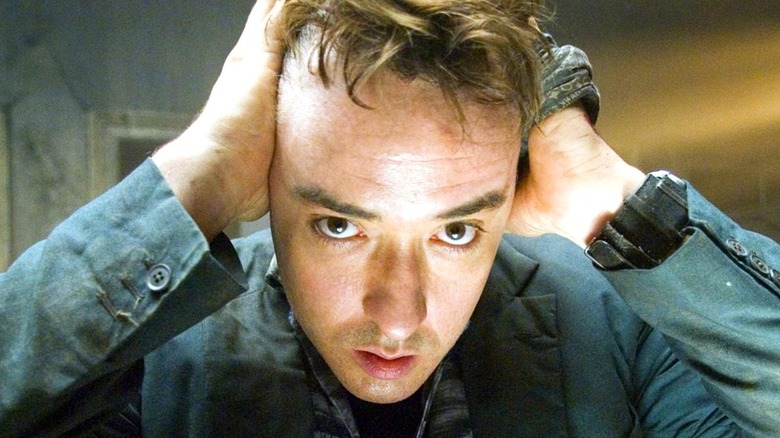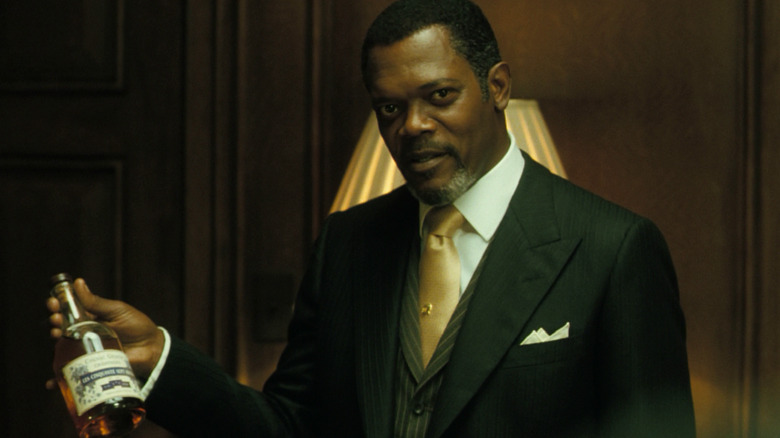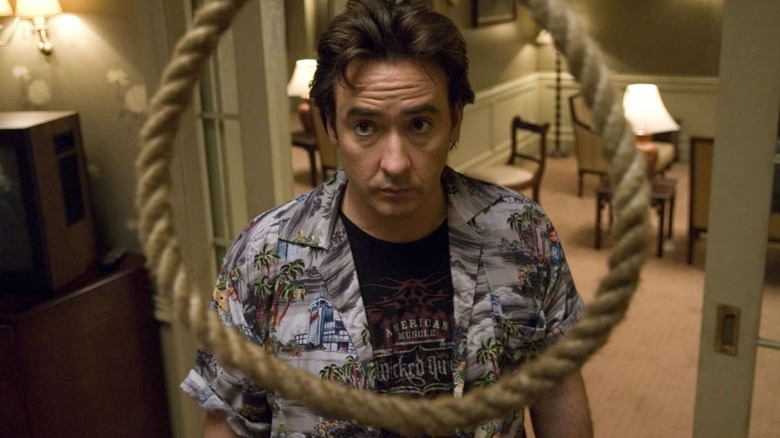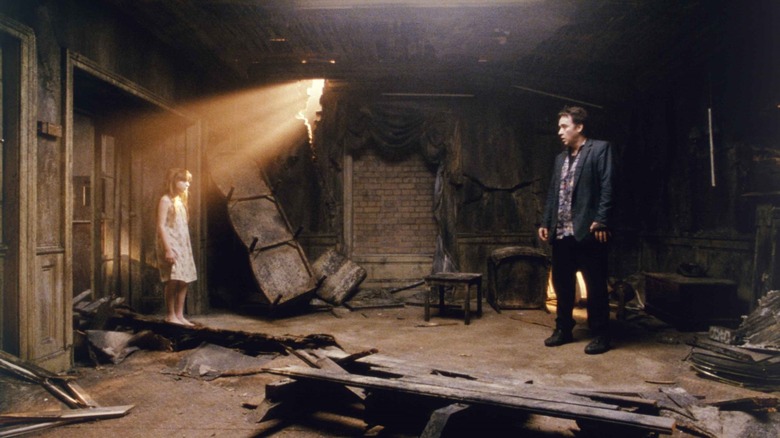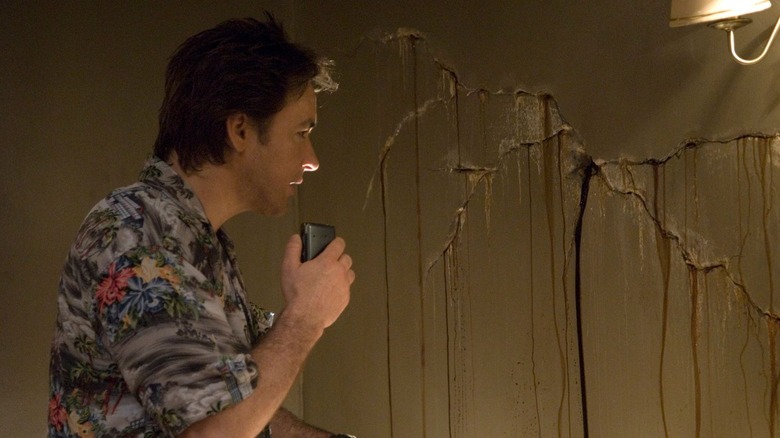The Alternate Ending Of 1408 Couldn't Be More Different
Stephen King is no stranger to adaptations. His doorstopper works like "The Shining" and brisker short stories like "Rita Hayworth and Shawshank Redemption" have inspired some of the most popular films of the 21st century. You could spend hours, days, maybe even weeks watching nothing but Stephen King adaptations and not get bored. Well, you might get bored, but that's on you. Still, it's easy for his less popular adaptations, the movies that aren't "The Green Mile" or "Carrie" or "It," to get lost in the shuffle. And yet, there's something special about "1408," which feels like a "Twilight Zone" episode with a luxurious runtime that sticks in the brain and begs for a little more interrogation, maybe even with a dash of introspection.
The film carves out a sliver in the writer Mike Enslin's life, who is played by a grumpy John Cusack. Enslin is an author who specializes in debunking ghost stories and haunted tales, the kind of man who has built a livelihood around being a buzzkill. In his drive to uncover the truth behind one of New York's most haunted hotel rooms, he checks into the old and stately Dolphin Hotel, home of the dreaded room 1408 (add it up).
Checking into 1408
The hotel manager, Gerald Olin, played by an equally as grumpy but more caring Samuel L. Jackson, tries his best to stop Mike from spending a night in the room. He claims the hotel room has taken over 50 lives and that no one has ever made it longer than an hour. Unbothered by the grisly crime photos Gerald shares with Mike, he takes the elevator to the 14th floor and checks in. What follows is a one man show that's rife with paranoia. Mike battles everything from a haunted clock radio to a possessed piece of artwork to a series of ghosts who try to drive him toward self harm. He's even visited by an evil version of his dead daughter. Despite the sheer demonic power of the room, Mike is able to defeat it and break away by setting it all on fire.
At least, that's one version of the ending.
The film adaptation of "1408" was released in 2007, although the short was published in 1999, so the story percolated for a good eight years before getting the film treatment. This eight year gap between the short story and the film makes them feel considerably different, with the short story taking a more minimalist, but morose bent and the film getting a little wilder and gorier with the details, while also pulling at the heart strings by turning the main character into a mourning father. And unlike the short story, the movie version of "1408" is bursting with alternate endings, all of which challenge the reality of what really happened in "1408."
The spookily sad theatrical cut
First, there's the theatrical cut. It's what you might call the "cannon" ending considering it's the ending that was shown in theaters and it's the default ending if you happen to own the DVD or catching this film streaming somewhere. It includes Mike setting the hotel room on fire and being rescued by firefighters who break the room down. It also features Mike pulling out his trusty tape recorder to see if his memories of his time in room 1408 are accurate. After pressing play, Mike is shocked to hear the voice of his dead daughter, solidifying the ghostly experiences that took place in the room. It's sad, spooky, and a reminder that grief often feels like being trapped in a haunted hotel room.
The morbidly sad director's cut
And then there's the director's cut. This version of walks the line between feeling more sad than the theatrical ending, while also having a more optimistic bend. Once again, Mike lights 1408 on fire, but instead of making it out with some burns and a life filled with harrowing memories, he perishes in the hotel room, joining the ghosts that pack the small space. After Mike's funeral, Gerald approaches Mike's wife Lily and his publisher Sam (played by Mary McCormack and Tony Shalhoub, respectively) and tries to give her a box of Mike's things, including his trusty tape recorder.
She refuses the gift and Gerald takes the box back to his car, where he decides to press play on that recorder. The tape starts with Mike's voice, which is immediately interrupted up by ghostly growls and pleas from Mike's deceased daughter. As Gerald looks out over the graveyard, he sees a little girl calling for her father. As she wanders off, Gerald is startled by the burned body of Mike, who is reaching out from the back seat of his car. After the apparition disappears, he watches the little girl meet up with her dad, and they both walk away among the graves. Cutting back to the hotel, the ghost of Mike hears his daughter calling for him and he saunters towards the door, supposedly joining her in the afterlife.
You'd think the ending where the protagonist dies would be the sad one of the bunch, but director Mikael Håfström was able to inject this version of the story with some sweet cheesy optimism, which makes it feel like a happy-go-lucky version of "The Shining." Mike may have been defeated by the hotel, but in the end, he is reunited with his daughter and the evil of 1408 was destroyed. The ending is almost played like a win-win, Mike get's to be with his girl again and no one will be hurt by the room ever again, but it's a toss up, really. Is living life knowing you were haunted worse? Or is it better to perish and defeat true evil?
The weirdly sad other ending
What, two different endings (three if you count the short story), weren't enough? You need another, slightly different chapter in the life of Mike Enslin? Lucky for you, there's more. The third possible ending in "1408" once again sees Mike dying in the fire, but quickly cuts to Los Angeles, where Lily and Sam are mourning Mike's loss. Sam leaves Lily to catch a flight back to New York, and as he walks into his office, he's handed a package with a return address from Mike. Inside, he finds a draft of the story "1408." As Sam turns the pages of the manuscript, sound bites from the movie are played over each other, signaling Sam's immersion in the story, as he gets drawn deeper and deeper into what happened behind the closed doors of 1408.
In a way, this ending hits the same sort of emotional beats as the theatrical ending. Sure, Mike isn't alive to deal with the horrors he's experienced, but Sam and his future readers act as his surrogate here. They must deal with the demonic force that controlled room 1408, and grapple with the fact that someone they loved or admired was taken from them by the room. In a way, this ending is the perfect middle ground between the theatrical ending and the director's cut. It still has Mike succumb to the power of the room, but instead of reveling in an afterlife scene that makes Mike's death seem worth it, this ending lives in that ambiguity and sadness. Mike's loved ones don't get the sense that he's moved on or in a better place. Instead, they must grapple with his surreal and haunting loss.
There's a joke here about Stephen King and endings, but it doesn't quite ring true for "1408." All of them tackle grief and its echoes in their own way. Despite what the directors or producers might say, whichever ending hits the hardest you the hardest, is the one true ending. Just don't forget to check out of the room once you're done visiting.
